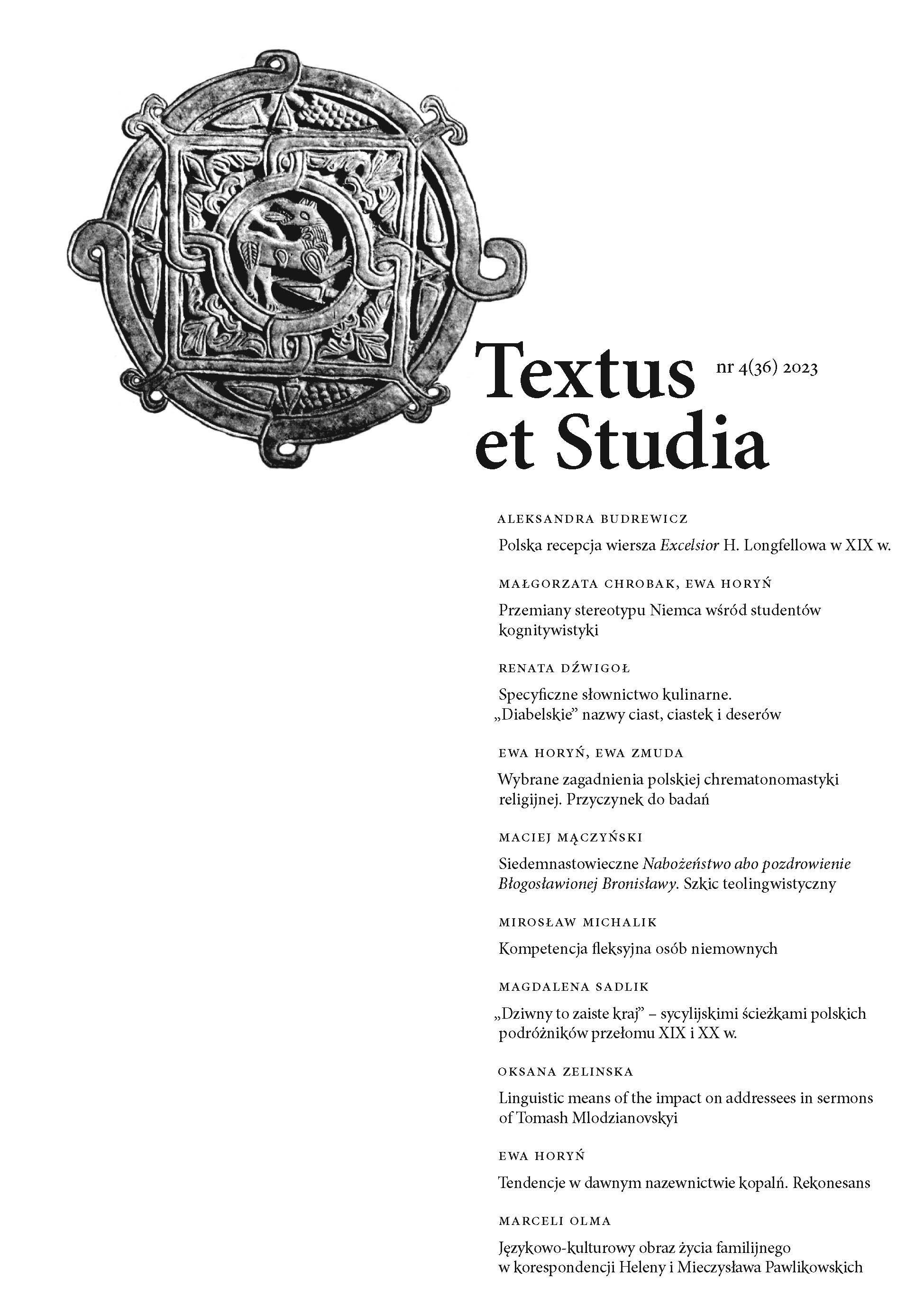Inflectional competence of language-disabled people
DOI:
https://doi.org/10.15633/tes.09406Keywords:
inflection, language inability, AACAbstract
The content of this paper constitutes an introduction to the issue known as inflectional competence, which refers to people affected by speech inability. Inflectional competence is based on the theory and practice of internal grammar, thanks to which it is treated as a brain function, a component of the subconscious mechanism of composing linguistic elements, a kind of competence which enables, above all, the reception of inflectional forms that signal syntactic functions and contribute semantic information. Such an approach makes it possible to relate the inflectional competence to people who are prelingually deprived of the gift of speech (in this context language), and hence, do not take up activities which a speaking person performs with the use of language. At the same time they do not recognise reality at the level of language-able people and do not convey its interpretation to other participants of social life. In the applicational part of the work, attention was paid to the very process of equipping a prelingually language-disabled person in inflectional competence, which takes place with the use of therapeutic systems and methods that belong to the sphere of activity known as Augmentative and Alternative Communication.
References
Beukelman D., Pat M., Augmentative & Alternative Communication. Supporting Children and Adults with Complex Communication Needs, Baltimore 2013.
Chomsky N., Koncepcje języka [w:] Noama Chomsky’ego próba rewolucji naukowej, t. 2: Generatywny program badań nad ludzkim umysłem, K. Rosner (oprac.), Warszawa 1996, s. 37–72.
Chomsky N., Zagadnienia teorii składni, Wrocław–Warszawa–Kraków–Gdańsk–Łódź 1982.
Grabias S., Postępowanie logopedyczne. Standardy terapii [w:] Logopedia. Standardy postępowania logopedycznego, S. Grabias, J. Panasiuk, T. Woźniak (red.), Lublin 2015, s. 13–35.
Grabias S., Teoria zaburzeń mowy. Perspektywy badań, typologie zaburzeń, procedury postępowania logopedycznego [w:] Logopedia. Teoria zaburzeń mowy, S. Grabias, M. Kurkowski (red.), Lublin 2012, s. 15–71.
Grzegorczykowa R., Wstęp do językoznawstwa, Warszawa 2007.
Heinz A., Dzieje językoznawstwa w zarysie, Warszawa 1978.
Łuczyński E., Wiedza o języku polskim dla logopedów, Gdańsk 2015.
Mecner P., Elementy gramatyki umysłu, Kraków 2005.
Michalik M., Budowanie kompetencji składniowej w dyskursie zaburzonym [w:] Logopedia. Wybrane aspekty historii, teorii i praktyki, S. Milewski, K. Kaczorowska-Bray (red.), Gdańsk 2012, s. 299–307.
Michalik M., „Gramatyka wewnętrzna” a kompetencja składniowa osób upośledzonych umysłowo [w:] Studia z logopedii i neurologopedii, I. Nowakowska-Kempna (red.), Kraków 2012, s. 33–53.
Michalik M., Lingwistyczno-logopedyczne podstawy komunikacji alternatywnej i wspomagającej. Ujęcie metodologiczne, Kraków 2018.
Michalik M., Syntactic competence in speech disorders – aneurosyntactic perspective, „Acta Neuropsychologica”, 13 (2015), nr 1, s. 33–48.
Michalik M., The acquisition of syntactic structures in the disturbed discourse [w:] Studies in cognitive semantics, B. Bierwiaczonek, A. Turula (red.), Częstochowa 2010, s. 117–130.
Michalik M., Przebinda E., Budowanie kompetencji lingwistycznej u osób niemówiących z wykorzystaniem strategii komunikacji alternatywnej [w:] Metody terapii logopedycznej, A. Domagała, U. Mirecka (red.), Lublin 2018, s. 143–181.
Michalik M., Przebinda E., Kompetencja składniowa osób niemówiących [w:] Studia logopedyczno-lingwistyczne. Księga jubileuszowa z okazji 70-lecia urodzin Profesora Edwarda Łuczyńskiego, S. Milewski, K. Kaczorowska-Bray, B. Kamińska (red.), Gdańsk 2017, s. 143–168.
Polański E., Nowak T., Najnowszy podręcznik gramatyki języka polskiego, Kraków 2011.
Stalmaszczyk P., Koncepcje „języka” i „gramatyki” w gramatyce generatywnej i w semantyce pojęciowej [w:] Metodologie językoznawstwa. Podstawy teoretyczne, red. P. Stalmaszczyk, Łódź 2006, s. 74–90.
Surowaniec J., Logopedyczny słownik angielsko-polski, polsko-angielski, Kraków 2012.
Tetzchner S., Martinsen H., Wprowadzenie do wspomagających i alternatywnych sposobów porozumiewania się, Warszawa 2002.
Downloads
Published
Issue
Section
License

This work is licensed under a Creative Commons Attribution 4.0 International License.
Authors who publish with this journal agree to the following terms:
- Authors retain the copyright and full publishing rights without restrictions, and grant the journal right of first publication with the work simultaneously licensed under a Creative Commons Attribution 4.0 International License that allows others to share the work with an acknowledgement of the work's authorship and initial publication in this journal.
- Authors are able to enter into separate, additional contractual arrangements for the non-exclusive distribution of the journal's published version of the work (e.g., post it to an institutional repository or publish it in a book), with an acknowledgement of its initial publication in this journal.
- Authors are permitted and encouraged to post their work online (e.g., in institutional repositories or on their website) prior to and during the submission process, as it can lead to productive exchanges, as well as earlier and greater citation of published work (See The Effect of Open Access).

